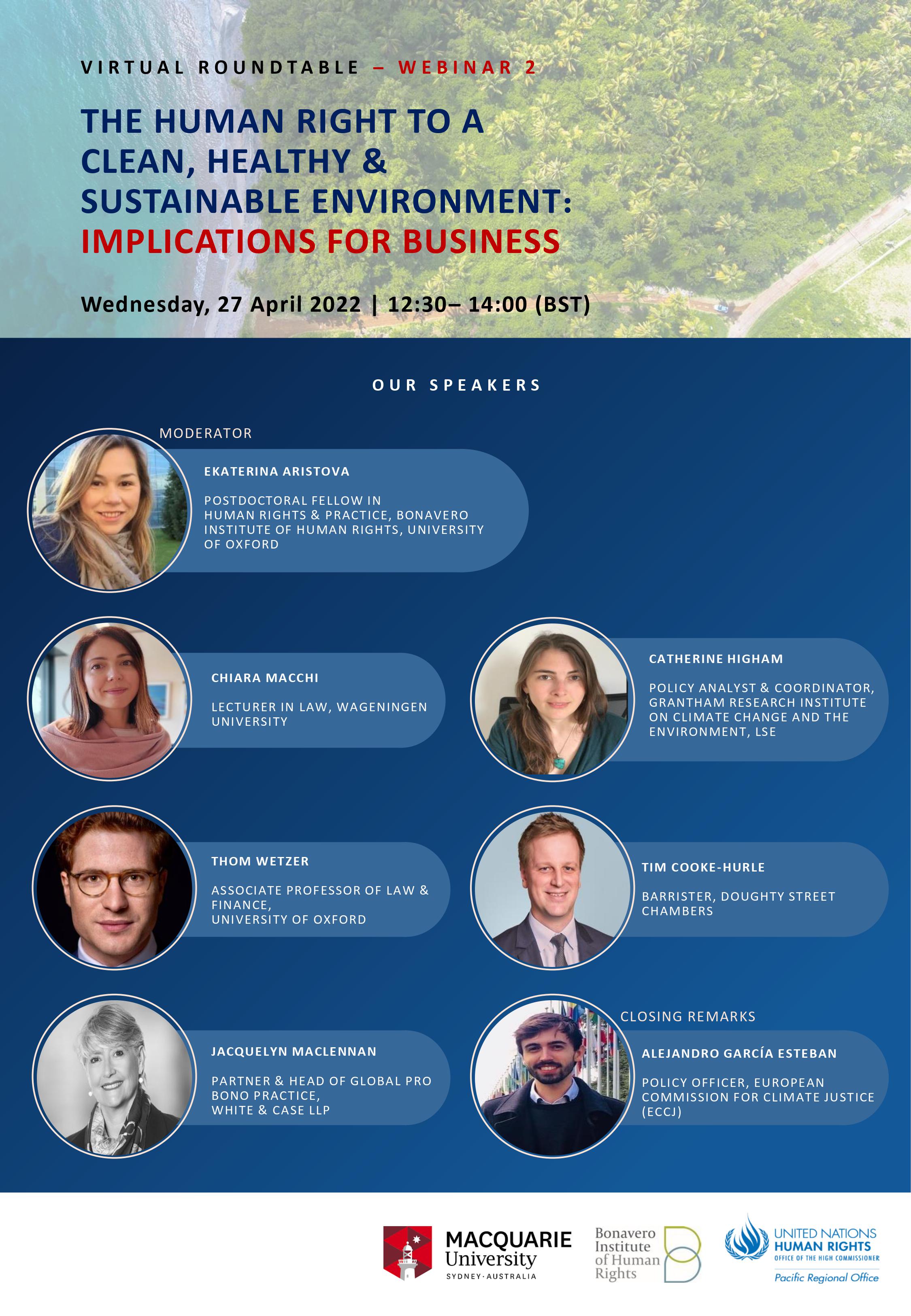The Human Right to a Clean, Healthy, and Sustainable Environment: Implications for Business
Notes & Changes
This is an online event. To attend, register here. Please note that this event may be recorded.

An explicit recognition of this right has implications for both states and business enterprises. The resolution primarily addresses what states should do to implement the right to a clean, healthy and sustainable environment. Yet, even business enterprises cannot ignore this development as they have a responsibility to respect all internationally recognised human rights under the UN Guiding Principles on Business and Human Rights. Moreover, on 23 February 2022, the European Commission released the Draft Directive on Corporate Sustainability Due Diligence. The Draft Directive recommends European Union member states to ensure that companies above a certain size conduct human rights and environmental due diligence. The covered companies should also adopt a plan to ensure that their business model and strategy are compatible with the limiting of global warming to 1.5 °C in line with the Paris Agreement.
How will the Human Rights Council’s resolution and the European Commission’s Draft Directive inform the corporate practice of human rights due diligence? Will they impact the content of mandatory human rights due diligence laws all over the world, the proposed business and human rights treaty and national action plans on business and human rights? How will consumers, investors and civil society organisations employ these normative developments to push for more sustainable business practices? Will these twin developments provide further impetus to strategic climate change litigation and/or complaints to non-judicial mechanisms against businesses?
To discuss some of these issues, a virtual roundtable comprising two inter-connected webinars is co-organised by the Cluster on Corporate Citizenship at Macquarie University, Sydney, the Office of the High Commissioner for the Pacific, and the Bonavero Institute of Human Rights at the Oxford Law Faculty. The first webinar took place on 7 April at 14:00 – 15:30 (AEST) and mostly focus on the Human Rights Council’s resolution. A recording of the first webinar is available here. Please join us for the second webinar on 27 April 2022 at 12:30 – 14:00 BST.
Panel
Dr Ekaterina Aristova (Moderator)
Dr Ekaterina Aristova is a Postdoctoral Fellow in Human Rights and Practice at the Bonavero Institute of Human Rights. She completed PhD at the University of Cambridge on the access to justice for victims of business-related human rights violations in the UK. Since 2019, she has been coordinating a project on civil liability for human rights violations. In May 2022, she will start a new research project on climate change litigation against corporations as a Leverhulme Early Career Research Fellow. Prior to commencing her academic career, Ekaterina practiced corporate law specialising on all aspects of M&A transactions.
Dr Thom Wetzer
Dr Thom Wetzer is Associate Professor of Law and Finance at the University of Oxford and the Founding Director of the Oxford Sustainable Law Programme. At Oxford, Thom is also a Fellow of Linacre College, Senior Research Fellow at the Institute for New Economic Thinking at the Oxford Martin School, a member of the Leadership Team at the Smith School of Enterprise and the Environment, Co-Lead (Law) at Oxford Net Zero, Lead Researcher at the Oxford Martin Initiative for a Net Zero Recovery, and a member of the Oxford-Man Institute of Quantitative Finance.
Dr Chiara Macchi
Dr Chiara Macchi is a lecturer in law at the Law Group, University of Wageningen. She has led an EU-funded Marie Curie research project focusing on business and human rights in the policies of the EU. Her recent research has focused on the climate change dimension of business and human rights, on the conflict minerals supply chain and on mandatory human rights and environmental due diligence legislation. Her monograph ‘Business, Human Rights and the Environment: The Evolving Agenda’ was published in 2022 by Asser/Springer. She coordinates the academic course ‘Law of Marine and Environments and Resources’ and is a co-founder of the Summer School ‘Business and Human Rights’.
Tim Cooke-Hurle
Tim Cooke-Hurle is a barrister practising at Doughty Street Chambers. He specialises in litigation and OECD complaints involving corporate accountability for human rights, environmental and climate change impacts.
Catherine Higham
Catherine Higham is a Policy Analyst and the Coordinator of the Climate Change Laws of the World project at the Grantham Research Institute on Climate Change and the Environment at the London School of Economics and Political Science (LSE). Catherine joined the Grantham Research Institute after nearly a decade of policy and advocacy work in the not for profit sector. Catherine holds an LLM from the University of British Columbia, where she also worked with the University Sustainability Initiative as the Coordinator of the UBC Climate Hub.
Jacquelyn MacLennan
Jacquelyn MacLennan is a Partner at White & Case. She is a core team member of the firm's Business & Human Rights Interest Group and advises on a wide range of issues related to ESG and sustainability, including corporate supply chain compliance, disclosure requirements, and Business & Human Rights issues generally. She also advises on EU customs and trade law, international sanctions, and EU regulatory requirements, notably in respect to product safety and environmental regulation. In October 2015, Jacquelyn became the Global Pro Bono Practice Leader.
Alejandro García Esteban
Alejandro García Esteban is a Policy Officer at the European Coalition for Corporate Justice (ECCJ), where he has been working on the research, design and promotion of Human Rights and Environmental Due Diligence legislation. He is a Spanish qualified lawyer with experience in national, EU and international labour and social law and litigation. In the past, he has worked, amongst others, for a private law firm, for the Spanish member of ECCJ, for the International Labour Organization, and as a guest lecturer in different universities.

